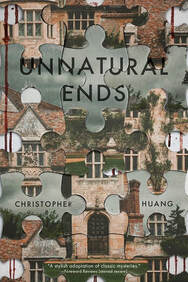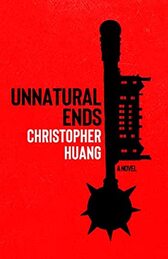
Three adopted siblings return to the chilly landscape of North Yorkshire upon learning of their father’s death. All three have proven themselves in places purposely far away: oldest brother Alan Linwood is an archaeologist, studying civilizations exotic and now extinct; Roger is a brilliant engineer, his talents spent perfecting innovations of air and road travel; and Caroline is a journalist in Paris, covering international news. Each of the Linwood siblings should be well-equipped to investigate their father’s murder, and in fact that is what Sir Lawrence Linwood commands that they do in his will. Should he meet an unnatural end, whomever of the three finds Father’s killer will inherit the ancient family home.
Huang divides his book into multiple third-person limited POV chapters, with each character providing a piece of the puzzle, either through experiences occurring in the story’s present time (April 1921) or years earlier (in 1904, when the three siblings were children and their personalities were being formed through internal logic and external pressures). This back-and-forth temporal structure was the primary reason why Unnatural Ends never really gained momentum for me: the present didn’t have much urgency when past events are given equal weight and page time.
There are two other elements that kept me reading more as an objective observer than as an engaged participant. First, in building his cast and shaping his story, Huang has set himself a paradoxically difficult task. We are supposed to invest in the investigation of Sir Lawrence’s murder, but from the start (and supported by each family member’s past and present experiences) Sir Lawrence is a cruel despot who enjoys making others suffer and bend to his will. His death by violence – bludgeoned by a spiked mace – is fitting, to say the least. While there is the dubious impetus of inheriting a family estate that is as cold and inhospitable as Father himself, there is no initial reason, whether rivalry, curiosity, or justice, for Alan, Roger, or Caroline to seek answers. Sagely, Huang soon gives them appropriate motivation: investigating the murder will provide answers to their own identities. It’s not Father who needs liberating but the adult children who can finally break free.

It is still a story worth recommending. The book’s prose is excellently crafted and presented; when it comes to historical details and literary syntax, the author rarely sounds a sour note or takes a wrong step. He is particularly good at using specifics to make his characters’ world believable and engaging. He describes the Yorkshire moors and the family’s looming stone castle, with its draughty servant passageways and its cliff-hugging sheer stone facade, in convincing sensory detail. The siblings bring elements of their global lives back with them: engineer Roger has tried to partner with Sopwith Aviation while Alan sees parallels between his native landscape and his vistas at Machu Picchu. The historical context is impeccably researched and vividly used; along with Huang’s confident prose, the contextual details make the book a success.
The author’s previous novel, 2018’s A Gentleman’s Murder, is also set in 1920s England and appears to offer a similar winning mix of history and mystery. Unnatural Ends has a U.S. release date of May 10. I received an advance reading copy through NetGalley in exchange for a forthright review.
 RSS Feed
RSS Feed